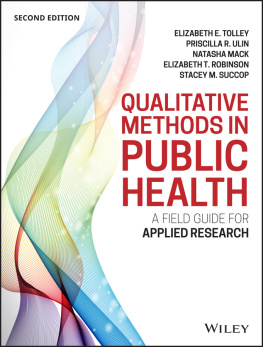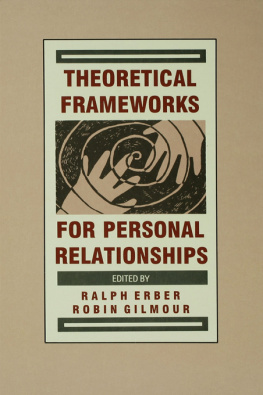Anfara Vincent A. - Theoretical frameworks in qualitative research
Here you can read online Anfara Vincent A. - Theoretical frameworks in qualitative research full text of the book (entire story) in english for free. Download pdf and epub, get meaning, cover and reviews about this ebook. year: 2014, publisher: SAGE Publications, genre: Politics. Description of the work, (preface) as well as reviews are available. Best literature library LitArk.com created for fans of good reading and offers a wide selection of genres:
Romance novel
Science fiction
Adventure
Detective
Science
History
Home and family
Prose
Art
Politics
Computer
Non-fiction
Religion
Business
Children
Humor
Choose a favorite category and find really read worthwhile books. Enjoy immersion in the world of imagination, feel the emotions of the characters or learn something new for yourself, make an fascinating discovery.

- Book:Theoretical frameworks in qualitative research
- Author:
- Publisher:SAGE Publications
- Genre:
- Year:2014
- Rating:4 / 5
- Favourites:Add to favourites
- Your mark:
- 80
- 1
- 2
- 3
- 4
- 5
Theoretical frameworks in qualitative research: summary, description and annotation
We offer to read an annotation, description, summary or preface (depends on what the author of the book "Theoretical frameworks in qualitative research" wrote himself). If you haven't found the necessary information about the book — write in the comments, we will try to find it.
Theoretical frameworks in qualitative research — read online for free the complete book (whole text) full work
Below is the text of the book, divided by pages. System saving the place of the last page read, allows you to conveniently read the book "Theoretical frameworks in qualitative research" online for free, without having to search again every time where you left off. Put a bookmark, and you can go to the page where you finished reading at any time.
Font size:
Interval:
Bookmark:
Theoretical Frameworks in Qualitative Research
Second Edition
W hen we initially set out to write a book about theoretical frameworks in qualitative research, there was little to guide graduate students and beginning researchers in their search for and use of theory in qualitative studies. Since the first edition of this book, a few thoughtful scholars have taken up the challenge and added their voices to the ongoing dialogue about the role and place of theoretical frameworks in qualitative research. Nevertheless, neither consensus nor clarity about the role or place of theoretical frameworks has emerged from the forum sufficient to justify one position or the other.
We remain committed to the position articulated in the first edition of the book. For us, the theoretical framework affects almost all aspects of a qualitative research study since it provides a lens for seeing and making sense of what to do in the design and conduct of the study. Nevertheless, we welcome the continuing dialogue about the role of theory in qualitative research.
As described in the preface to the first edition, the book grew out of our experiences as teachers of qualitative methods. When we discussed theory in class, students appeared to have a difficult time grasping the role of theory in qualitative research and asked a litany of questions about how to find a theory, how to use it, and how it affects the research. They reported that as they explored the literature on the topic, they found competing conceptualizations and even definitions. As Vince and I shared our attempts to clarify the role, place, and source of frameworks for our students, we struggled to clarify our own conceptions and to work together to answer student questions and concerns. As we did so, we became more aware of the limitations of existing books and more confident that we had a position to share with others. This led us to begin discussing the idea of writing a book that would be clear and accessible to students, and we were pleased to gain the support and encouragement for such a book from SAGE Publications, which provided us with a way to share our conceptions with a wider audience.
Beyond sharing our perspective and definition of the role and place of theory in qualitative research, conceptually, we believed that what would be most helpful to students and beginning researchers would be to hear from an array of researchers who had successfully used theory in the conduct of their research, had published such research in peer-reviewed journals, and were able to reflect on the theoretical framework they had used: how they found it, why they used it, and how it affected their research. Thus, we issued a call for manuscripts that would do just that, reflect on the use of theory in a study they had had published. From the many manuscripts we received, we selected 10 that fit our conception and provided narratives about a variety of theoretical frameworks. Based on feedback to the chapters in the first edition from students, reviewers, and researchers in the field, for this second edition, we kept six of the original chapters from the first edition, asked two of the original authors to combine their chapters to more clearly demonstrate the use of different theoretical frameworks with the same data, and solicited a few new chapters based on qualitative studies that had appeared in top-tier journals in the intervening period. We chose these additions to add breadth and variety to the frameworks discussed. Another change we made for this second edition was to ask each of the authors, as they reviewed and revised, or produced their chapters for the new edition, to add a frontispiece to their chapter explaining what theory is discussed in the chapter and what the reader would gain from reading their chapter. Furthermore, we asked the authors to do something we had not thought to do in the first editionto cite the study on which the chapter was based up front, following this brief abstract, so it would be easy for readers to access the study if they wished. This is thus the format for each of the contributing chapters.
We added yet another piece to the book, a few briefs from doctoral students with whom we had worked about the theoretical framework they had used in their dissertations. While just that, briefs, we thought that it would increase the number and variety of theoretical frameworks shared and do so with brevity. While not all of the students we solicited were able to respond to our solicitation, five of them did, and we are pleased to share their briefs in this edition.
We framed the contributing chapters as we had done in the first editionfirst, with a chapter contextualizing the discussion of the role and place of theoretical frameworks from our perspective and, last, with an attempt to draw meaning and usefulness from the array of theoretical frameworks discussed in the book.
Taken together, we believe that the alterations and additions to this edition add significantly to the number and richness of theoretical frameworks the reader can learn about, and provide access into the thinking of the researchers as they sought, chose, and used the frameworks they did. Hopefully, this rich array will stimulate the readers quest for such frameworks and help them use the framework they choose effectively.
Just as we began to solicit new authors for this edition and frame what we wished to do in this second edition, my collaborator and colleague, Vince Anfara, diedunexpectedly and way too young. I have tried to carry out the plan we conceived for the book and to make this second edition a tribute to our collaboration. That would not have been possible without the patience, support, and encouragement of the contributing authors and the incredibly professional staff at SAGEin particular Helen Salmon, acquisitions editor; Anna Villarruel, editorial assistant; and Libby Larson, production editoras well as the contribution of Shamila Swamy and her copyediting team from QuADS Prepress.
I would also like to thank Wade McGarity for his invaluable technical assistance, without which it would not have been possible for me to pull all of the pieces of this book together.
Norma T. Mertz
Theoretical Frameworks in Qualitative Research
Second Edition
Edited by
Vincent A. Anfara Jr.
Norma T. Mertz
University of Tennessee


FOR INFORMATION:
SAGE Publications, Inc.
2455 Teller Road
Thousand Oaks, California 91320
E-mail:
SAGE Publications Ltd.
1 Olivers Yard
55 City Road
London EC1Y 1SP
United Kingdom
SAGE Publications India Pvt. Ltd.
B 1/I 1 Mohan Cooperative Industrial Area
Mathura Road, New Delhi 110 044
India
SAGE Publications Asia-Pacific Pte. Ltd.
3 Church Street
#1004 Samsung Hub
Singapore 049483
Acquisitions Editor: Helen Salmon
Editorial Assistant: Anna Villarruel
Production Editor: Libby Larson
Copy Editor: QuADS Prepress (P.) Ltd.
Typesetter: Hurix Systems Pvt. Ltd.
Proofreader: Dennis W. Webb
Indexer: Sheila Bodell
Cover Designer: Candice Harman
Marketing Manager: Nicole Elliott
Copyright 2015 by SAGE Publications, Inc.
All rights reserved. No part of this book may be reproduced or utilized in any form or by any means, electronic or mechanical, including photocopying, recording, or by any information storage and retrieval system, without permission in writing from the publisher.
Next pageFont size:
Interval:
Bookmark:
Similar books «Theoretical frameworks in qualitative research»
Look at similar books to Theoretical frameworks in qualitative research. We have selected literature similar in name and meaning in the hope of providing readers with more options to find new, interesting, not yet read works.
Discussion, reviews of the book Theoretical frameworks in qualitative research and just readers' own opinions. Leave your comments, write what you think about the work, its meaning or the main characters. Specify what exactly you liked and what you didn't like, and why you think so.





